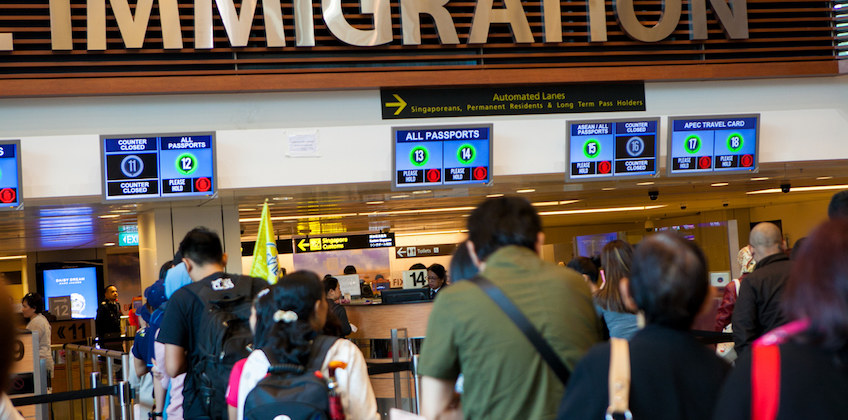Discrimination Lawsuit against Presidential Executive Order Launched in California

En Español: Demanda por discriminación en contra de la Orden Ejecutiva Presidencial entablada en California
By Gordon Gibb
Oakland, CA: It didn’t take long for discrimination lawsuits to begin flowing following President Donald Trump’s January 27 Executive Order barring citizens from seven predominantly Muslim countries from entering the US. To that end the American Civil Liberties Union (ACLU) has filed a discrimination lawsuit on behalf of three university students and others in California, citing the Trump executive order as unconstitutional.
The lawsuit, filed with the help of a discrimination lawyer, also includes amongst the plaintiffs the Jewish Family and Community Services (JFCS) organization of East Bay. The lawsuit is proposed as a class action and casts the travel ban as unlawful, as well as an attempt to needlessly discriminate against Muslims and establishing a preference for one religion over another, or so it is alleged.
The three student plaintiffs carry F-1 student visas. In spite of possessing those documents, the students are now unable to travel. Plaintiff Wasim Ghaleb, a Yemeni student at Grossmont College in San Diego, had traveled to Saudi Arabia on January 15 – 12 days before the ban – to visit his family. Ghaleb had planned to return to California for the spring semester.
Hadil Al-Mowafak is a Stanford University freshman with an F-1 student visa who was originally unable to travel to visit her husband in Yemen because of the executive order.
There have been developments since the lawsuit was launched. A federal justice on Friday placed a temporary stay on the travel ban, effectively blocking Trump’s executive order. The Trump Administration, in response, immediately announced it would fight the stay of the travel ban and launched an appeal. Earlier this weekend immigration experts were opining that while the temporary stay on the travel ban would, in theory allow immigrants holding valid visas from the seven targeted countries to enter the US, the situation remained tenuous. Officials were advising targeted individuals to travel ‘as soon as possible,’ amidst a caution there were still no guarantees.
Early yesterday, The Los Angeles Times (02/05/17) in the wee hours of Sunday morning, reported that the Ninth US Circuit Court of Appeals in San Francisco denied a request by the US Department of Justice (DOJ) for a stay on the travel ban issued February 3 – effectively opening ports for those who were affected by the ban when Trump’s executive order was signed on January 27.
The government, however while indicating it would respect the decision of the Ninth Circuit, nonetheless signaled it would continue to pursue any means within its jurisdiction to re-instate the travel ban.
In sum, individuals originally affected by the travel ban – including the three student plaintiffs – should now be in a position to travel, for the time being. It is unknown if the discrimination lawsuit will pause, or move ahead given a situation that continues to be tenuous.
“The federal government has made it clear that it intends to favor Christian immigrants over Muslims in making decisions about who to detain, interrogate, deport, or entirely refuse entry,” Julia Mass, senior staff attorney with the ACLU of Northern California, said in a statement on February 2. “We are a diverse society. American Muslims, immigrants and US–born alike, are part of the fabric of this nation.”
A spokesperson for JFCS East Bay, Avi Rose, expressed similar sentiments. “This executive order is dishonoring our history, it’s dishonoring our values, and it’s bringing chaos and despair to the lives of everyday people,” said Rose, who serves as Executive Director of JFCS East Bay.
Discrimination lawsuits can run the gamut from age discrimination, to gender inequality. Racial and religious discrimination is also not without precedent. In this case, the discrimination lawsuit alleges that the federal government’s actions violate the First Amendment, as well as equal protection and due process rights granted under the Fifth Amendment, the Immigration and Nationality Act, and the Administrative Procedure Act.
In excess of 60 federal discrimination lawsuits have been filed in the days since President Trump signed his Executive Order on January 27.
The California lawsuit, alleging discrimination, is Al-Mowafak et al. v. Trump et al., Case No. 3:17-cv-00557, in the US District Court for the Northern District of California.
The lawsuit, filed with the help of a discrimination lawyer, also includes amongst the plaintiffs the Jewish Family and Community Services (JFCS) organization of East Bay. The lawsuit is proposed as a class action and casts the travel ban as unlawful, as well as an attempt to needlessly discriminate against Muslims and establishing a preference for one religion over another, or so it is alleged.
The three student plaintiffs carry F-1 student visas. In spite of possessing those documents, the students are now unable to travel. Plaintiff Wasim Ghaleb, a Yemeni student at Grossmont College in San Diego, had traveled to Saudi Arabia on January 15 – 12 days before the ban – to visit his family. Ghaleb had planned to return to California for the spring semester.
Hadil Al-Mowafak is a Stanford University freshman with an F-1 student visa who was originally unable to travel to visit her husband in Yemen because of the executive order.
There have been developments since the lawsuit was launched. A federal justice on Friday placed a temporary stay on the travel ban, effectively blocking Trump’s executive order. The Trump Administration, in response, immediately announced it would fight the stay of the travel ban and launched an appeal. Earlier this weekend immigration experts were opining that while the temporary stay on the travel ban would, in theory allow immigrants holding valid visas from the seven targeted countries to enter the US, the situation remained tenuous. Officials were advising targeted individuals to travel ‘as soon as possible,’ amidst a caution there were still no guarantees.
Early yesterday, The Los Angeles Times (02/05/17) in the wee hours of Sunday morning, reported that the Ninth US Circuit Court of Appeals in San Francisco denied a request by the US Department of Justice (DOJ) for a stay on the travel ban issued February 3 – effectively opening ports for those who were affected by the ban when Trump’s executive order was signed on January 27.
The government, however while indicating it would respect the decision of the Ninth Circuit, nonetheless signaled it would continue to pursue any means within its jurisdiction to re-instate the travel ban.
In sum, individuals originally affected by the travel ban – including the three student plaintiffs – should now be in a position to travel, for the time being. It is unknown if the discrimination lawsuit will pause, or move ahead given a situation that continues to be tenuous.
“The federal government has made it clear that it intends to favor Christian immigrants over Muslims in making decisions about who to detain, interrogate, deport, or entirely refuse entry,” Julia Mass, senior staff attorney with the ACLU of Northern California, said in a statement on February 2. “We are a diverse society. American Muslims, immigrants and US–born alike, are part of the fabric of this nation.”
A spokesperson for JFCS East Bay, Avi Rose, expressed similar sentiments. “This executive order is dishonoring our history, it’s dishonoring our values, and it’s bringing chaos and despair to the lives of everyday people,” said Rose, who serves as Executive Director of JFCS East Bay.
Discrimination lawsuits can run the gamut from age discrimination, to gender inequality. Racial and religious discrimination is also not without precedent. In this case, the discrimination lawsuit alleges that the federal government’s actions violate the First Amendment, as well as equal protection and due process rights granted under the Fifth Amendment, the Immigration and Nationality Act, and the Administrative Procedure Act.
In excess of 60 federal discrimination lawsuits have been filed in the days since President Trump signed his Executive Order on January 27.
The California lawsuit, alleging discrimination, is Al-Mowafak et al. v. Trump et al., Case No. 3:17-cv-00557, in the US District Court for the Northern District of California.











No Comments